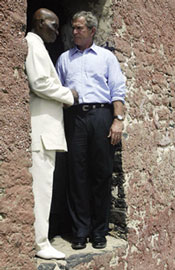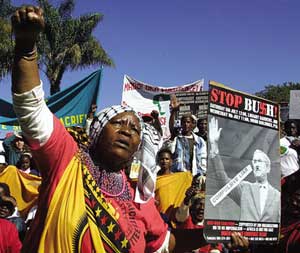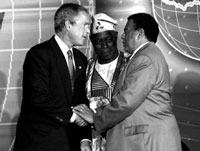
and
Eric Ture Muhammad
Motives of Bush’s Africa trip debated
(FinalCall.com) – Fresh from a whirlwind trip to Africa, President George W. Bush has many observers still trying to figure out just why he went in the first place.
The trip took one week, with some stops as short as six hours with heads of state and public photo ops.
One highlight of the journey was Mr. Bush and Senegalese President Abdoulaye Wade standing in the “Door of No Return” on the infamous Goree Island, from which millions of slaves were shipped to “the new world.”
But even that gesture was a problem for many, particularly Black Americans, who had hoped that the president–who had ignored the 2001 UN conference on race in Durban, South Africa–would issue an apology for slavery.
Did Pres. Bush venture to Africa to escape the brewing firestorm over untrue information he presented about Iraq purchasing nuclear material from an African country? The false information ultimately justified, in the public’s eye, his attack on the Muslim country.
Was the excursion designed to portray the new century man of war as a compassionate, humane leader just ahead of the 2004 presidential race?
Or perhaps it was to lobby for greater leverage on African soil in order to secure America’s access to the continent’s critical mineral resources and new sources for oil.
Ironically, or perhaps intentionally, Mr. Bush’s trip occurred at the same time of the first official meeting of the African Union (AU) since it was officially inaugurated in Durban, South Africa, last year. African leaders gathered to discuss in detail Africa’s fate and their role as nations in alleviating her suffering–many of the same problems Pres. Bush said he was there to help the continent to overcome.
Yet, Pres. Bush made no overture toward the summit.
“To be there the same time the AU is meeting and not approach them, address them or send any statement just shows the continued lack of regard for Africa,” said Adjoa Aaiyetorro, legal counsel for the National Coalition of Blacks for Reparations in America (NCOBRA). “His leadership is just another example of White supremacy gone amuck. The trip to Africa is just another insult.”
“It was no coincidence that this visit coincided with the eve of the African Union summit in Mozambique,” concurred a recent newspaper commentary published in the London-based Arabic language daily, Al Hayat. “It is a clear message that underlines the American position, namely that it pays no heed to regional organizations and calls for partnership with the U.S. based on mutual interests,” which is the content of the message that Pres. Bush delivered to the eight African leaders he met in Dakar.
Pres. Bush left the United States armed with good tidings for the Mother Continent: He had announced a $15 billion package to fight HIV/AIDS; a $10 billion aid package, called the Millennium Challenge Account, to alleviate poverty; and billions to fight terrorism.
Already in progress is a “stick-and-carrot” economic package called the New Partnership for Africa’s Development (NEPAD), which is based on opening markets, law and order and “good governance.” Pres. Bush met with the main proponents of NEPAD on the continent–presidents Wade, Thabo Mbeki of South Africa and Olusegun Obasanjo of Nigeria.

Protests meet Bush
Despite vocal protests that met him in Senegal and South Africa and the apparent tension in the initial stages of his meeting with Mr. Mbeki, Pres. Bush continued to put a happy face on the trip.
Acknowledging that the U.S. would continue to speak out on Zimbabwe, Mr. Bush said Pres. Mbeki was in touch with both parties involved in Zimbabwe’s problems.
“He (Mbeki) is–he believes–making good progress. And the U.S. supports him in this effort,” Pres. Bush said.
Observers are watching and hoping that Mr. Mbeki will not bow to western demands to distance himself from Mr. Mugabe, fearing that such a move would open the way for the Bush administration and Prime Minister Tony Blair of Britain to put a “Saddam Hussein” cloak on him and move to physically exterminate the president of Zimbabwe.
The issue is also tenuous because Mr. Mugabe stands on a controversial land reform platform that, if successful, could spread to Namibia and South Africa, where Whites own a disproportionate amount of the arable land.
“The president may be callously manipulating Africa’s suffering to present a veneer of compassion and the American public is being misled,” commented Salih Booker, executive director of Africa Action concerning the aid packages proposed by Mr. Bush.
For example, the $15 billion, five-year proposal already is being chiseled away at by Congress. Many global AIDS activists don’t feel the amount will ever approach $15 billion.
“This has turned out to be a cruel hoax,” Mr. Booker said.
First term Georgia Congresswoman Denise Majette (D), told a forum audience in Atlanta that the Bush administration is “blowing smoke” when it comes to HIV/AIDS funding. She said the money doesn’t exist, and when it comes up for appropriations, the Republican Senate “will find another place to shift it.”
“We are glad that President Bush traveled to the continent Africa. However, one of the single most pressing issues to the people of Africa will not be addressed on his tour–Africa’s debilitating foreign debts,” said Mara Vanderslice, program director of the Jubilee USA Network in Washington, D.C. “Countries in sub-Saharan Africa pay out $14.5 billion every year in debt service. This is more than the continent receives in foreign aid, which is around $12 billion, and more than is needed to stem the tide of AIDS, estimated at $10 billion annually.
“The legislation President Bush signed on AIDS called on his administration to negotiate for deeper debt relief. Pres. Bush is effectively ignoring the will of Congress,” she said.
Getting away from OPEC
There is also the oil motive that analysts keep coming back to. With Iraq already out of the OPEC picture, a U.S. move to gain access to West African oil could put the nail in the coffin of the primarily Arab OPEC oil cartel that the U.S. feels has a stranglehold on the oil market.
“The Bush administration is driven more by a cynical preoccupation with securing oil reserves than with matters of promoting genuine economic development,” said Bill Fletcher, president of TransAfrica Forum.
With an oil pipeline near completion from Niger through Cameroon, and the U.S. talking about establishing a Naval base in Sao Tome in the Gulf of Guinea, U.S. motives become clearer, observers note.
“This is what you call paying for the stage,” observed researcher Steve Cokely. “It was all a staged show, like Ed Sullivan in Africa. With every presidential mission, there are hundreds of side meetings that go on in a clandestine way that are not known to the public. This secret collaboration with African leadership could be a pay master operation” where loyalties are purchased via the immunity presidential powers grant to allow the flow of millions of dollars to broker agreements, he commented.
But many Black leaders declared from their podiums that if Pres. Bush really cares about African people, he can start with those who live in the United States.

NAACP president Kweisi Mfume upbraided the president for snubbing their conference in Miami taking place at Final Call press time. He has refused Mr. Mfume’s request for a meeting so many times over the years that the NAACP president stopped asking. (See related story on page 7.)
On the floor of Congress, members of the Congressional Black Caucus expressed their disappointment at a president who has yet to meet with them standing on Goree Island supposedly feeling sorrow for millions of deceased slaves.
“This morning, the president denounced slavery as one of the greatest crimes of history and called it a sin, which it was, but he failed to offer an apology on behalf of the Government of the United States that engaged in this deplorable, despicable institution for hundreds of years,” declared Rep. Barbara Lee (D-Calif.).
“On Goree Island, President Bush stated that history moves in the direction of justice. But then I had to ask myself, why does he oppose affirmative action?” she said.
New York Rep. Gregory Meeks (D), told a New York reporter that Mr. Bush does not possess “a great depth of knowledge as far as Africa is concerned. Members of the Congressional Black Caucus have lifetime commitments to the African continent,” he said.
“It would seem to me that the president of the United States could tap that expertise,” he added, noting that former president Bill Clinton took members of the Black Caucus with him on both of the president’s trips to Africa, in 1998 and in 2000.
Related news:
- Activists closely watch Bush in Africa
- Africa Under Bush: A Non-Issue? (FCN, 01/01/2001)












